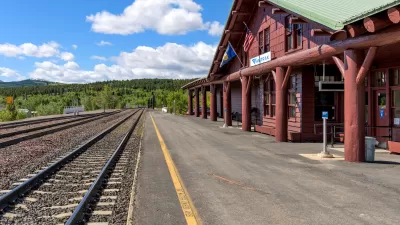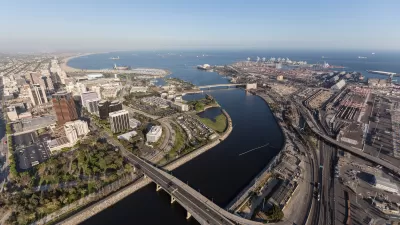Hyperloops and wider highways don't shrink commute times, the real factor in how long people will drive is how long people are willing to drive.

The Hyperloop is a compelling idea, and it has led to a lot of expansive thinking about the future of life and transit, but it's not going to shorten the average American commute, according to the case made by Emily Badger in the New York Times. Even if the Hyperloop ever does get built (a big if) it's unlikely to change the length of the average American commute or even the commute of the town in which it gets built. Because more infrastructure doesn't mean shorter commutes, and it never has.
Commute times have held relatively steadily across time and geography. "Of course plenty of workers trek less or much more, but average American commute times have budged only modestly over the last 35 years, since the census began asking about them," Emily Badger writes. She goes on to point out average commute times around the globe generally sit close to this number as well. None of this is to say changes in travel infrastructure can't change people's lives. They may make us safer, change the places we live, work and entertain ourselves. Even if the Hyperloop comes to fruition, which Badger calls a "wild hypothetical," it won't change the length of our average commutes.
FULL STORY: Why Even the Hyperloop Probably Wouldn't Change Your Commute Time

Alabama: Trump Terminates Settlements for Black Communities Harmed By Raw Sewage
Trump deemed the landmark civil rights agreement “illegal DEI and environmental justice policy.”

Planetizen Federal Action Tracker
A weekly monitor of how Trump’s orders and actions are impacting planners and planning in America.

Why Should We Subsidize Public Transportation?
Many public transit agencies face financial stress due to rising costs, declining fare revenue, and declining subsidies. Transit advocates must provide a strong business case for increasing public transit funding.

Understanding Road Diets
An explainer from Momentum highlights the advantages of reducing vehicle lanes in favor of more bike, transit, and pedestrian infrastructure.

New California Law Regulates Warehouse Pollution
A new law tightens building and emissions regulations for large distribution warehouses to mitigate air pollution and traffic in surrounding communities.

Phoenix Announces Opening Date for Light Rail Extension
The South Central extension will connect South Phoenix to downtown and other major hubs starting on June 7.
Urban Design for Planners 1: Software Tools
This six-course series explores essential urban design concepts using open source software and equips planners with the tools they need to participate fully in the urban design process.
Planning for Universal Design
Learn the tools for implementing Universal Design in planning regulations.
Caltrans
Smith Gee Studio
Institute for Housing and Urban Development Studies (IHS)
City of Grandview
Harvard GSD Executive Education
Toledo-Lucas County Plan Commissions
Salt Lake City
NYU Wagner Graduate School of Public Service





























